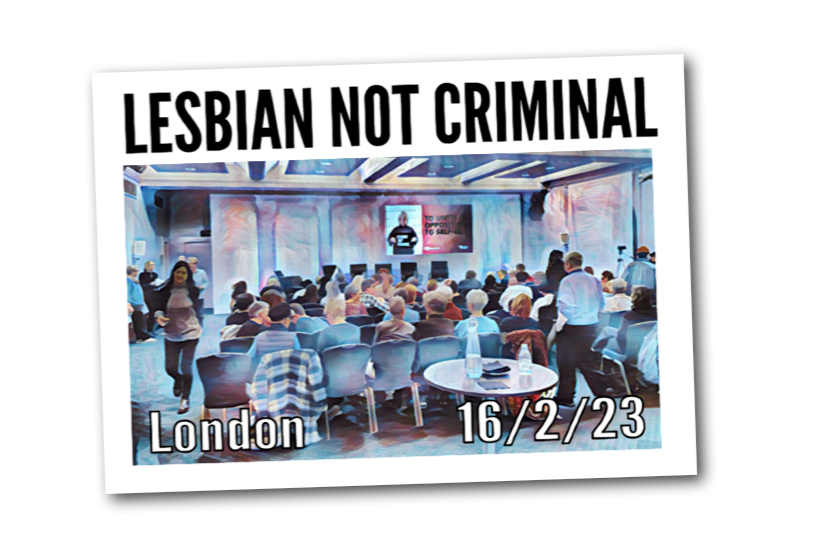
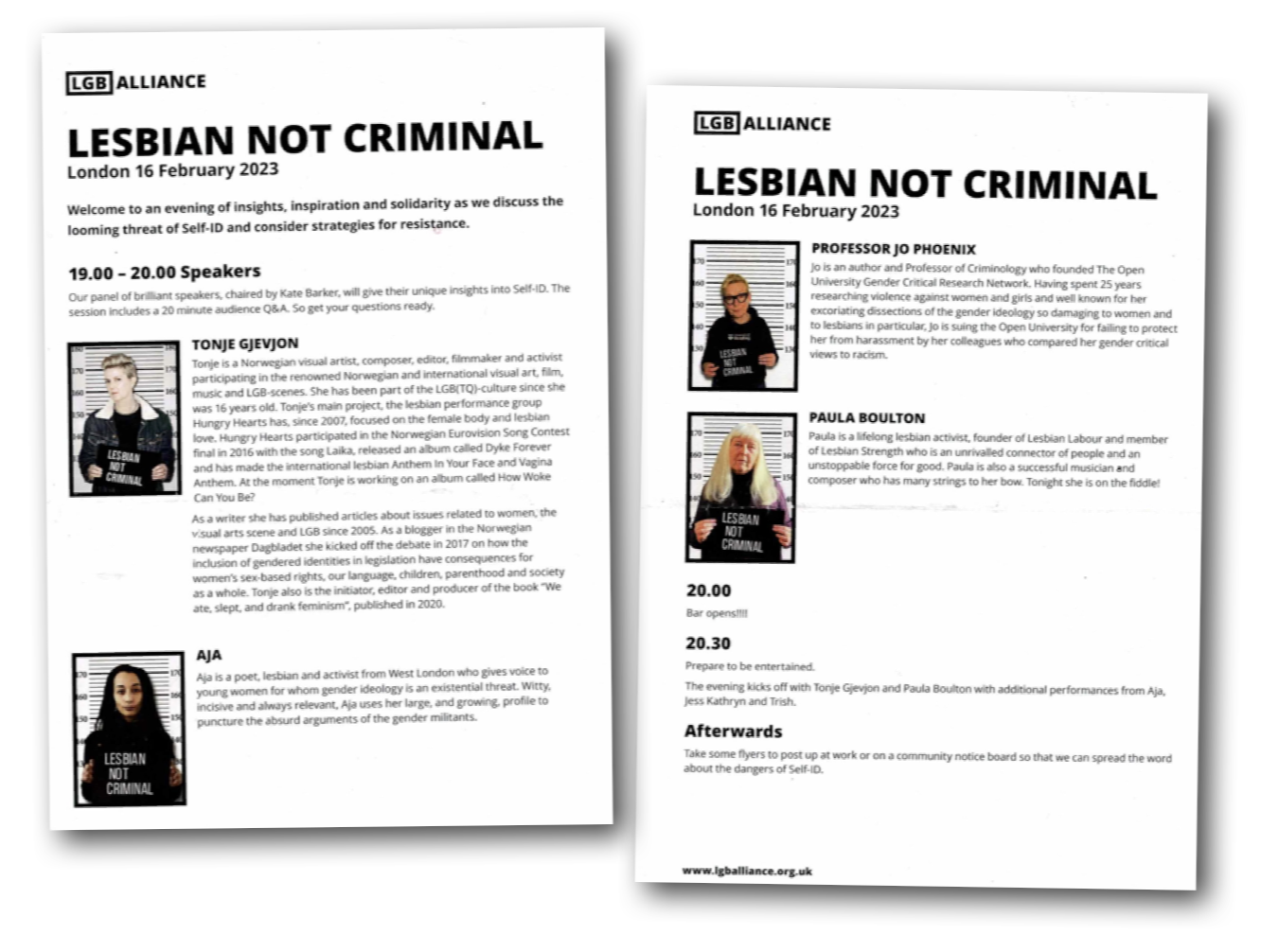
Why ‘lesbian not criminal‘?
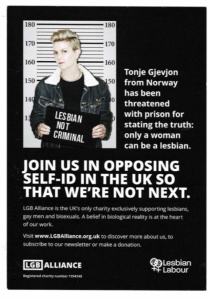 Tonje Gjevjon, a lesbian artist, musician and activist found herself on the wrong side of self-ID when she was recently threatened with prosecution under Norway’s 2020 ‘hate’ legislation.
Tonje Gjevjon, a lesbian artist, musician and activist found herself on the wrong side of self-ID when she was recently threatened with prosecution under Norway’s 2020 ‘hate’ legislation.
In October 2022 she posted on Facebook, writing (in Norwegian) that men cannot get pregnant, or be lesbians. “Menn er menn uansett seksuelle fetisjer – Men are men regardless of their sexual fetishes” she wrote, naming – or ‘deadnaming’ a local man, ‘Christine’ Jentoft. You can read more about her case here.
The ‘lesbian not criminal’ tour visited Edinburgh (Feb 13th) Cardiff (15th) and concluded in London on the 16th.
The LGB Alliance called it “an event organised by lesbians for lesbians” while making it clear that bisexual and straight womern were also welcome to join this “opportunity to plan, make connections and share experiences”.
There would be speakers and a bar with drinks and sandwiches and live music. How could I miss it?
Having been assured that the event was also open to bi and straight women, I bought a ticket and trundled along to the Church House Conference Centre to see new faces and old, and hear what the panel- Tonje Gjevjon, Aja ‘the Empress’, Jo Phoenix and Paula Bolton had to say.
I was also really hoping Tonje would perform her ‘greatest hits’ – Vagina Anthem and Laika. I was not disappointed.
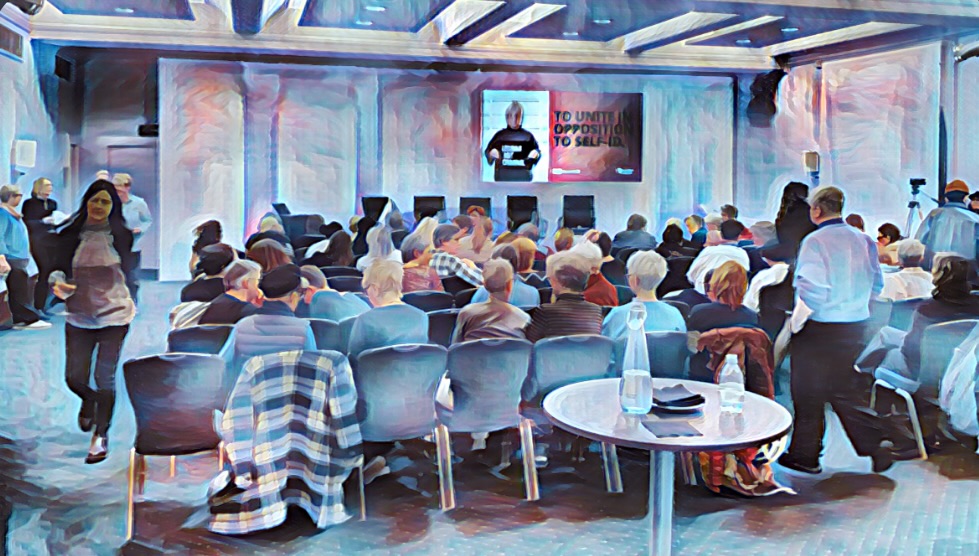
women in the conference room, shortly before the panel started
The LGB Alliance page for the event points out that we are in danger of going the same way as Norway, where self-ID was adopted in 2016. Self-ID “allow(s) any man to declare himself a woman and a lesbian.” Under self-ID law “it is considered prejudiced to say that a man cannot be a lesbian.”
In Norway, all services for women are now open to male-bodied people- aka men.
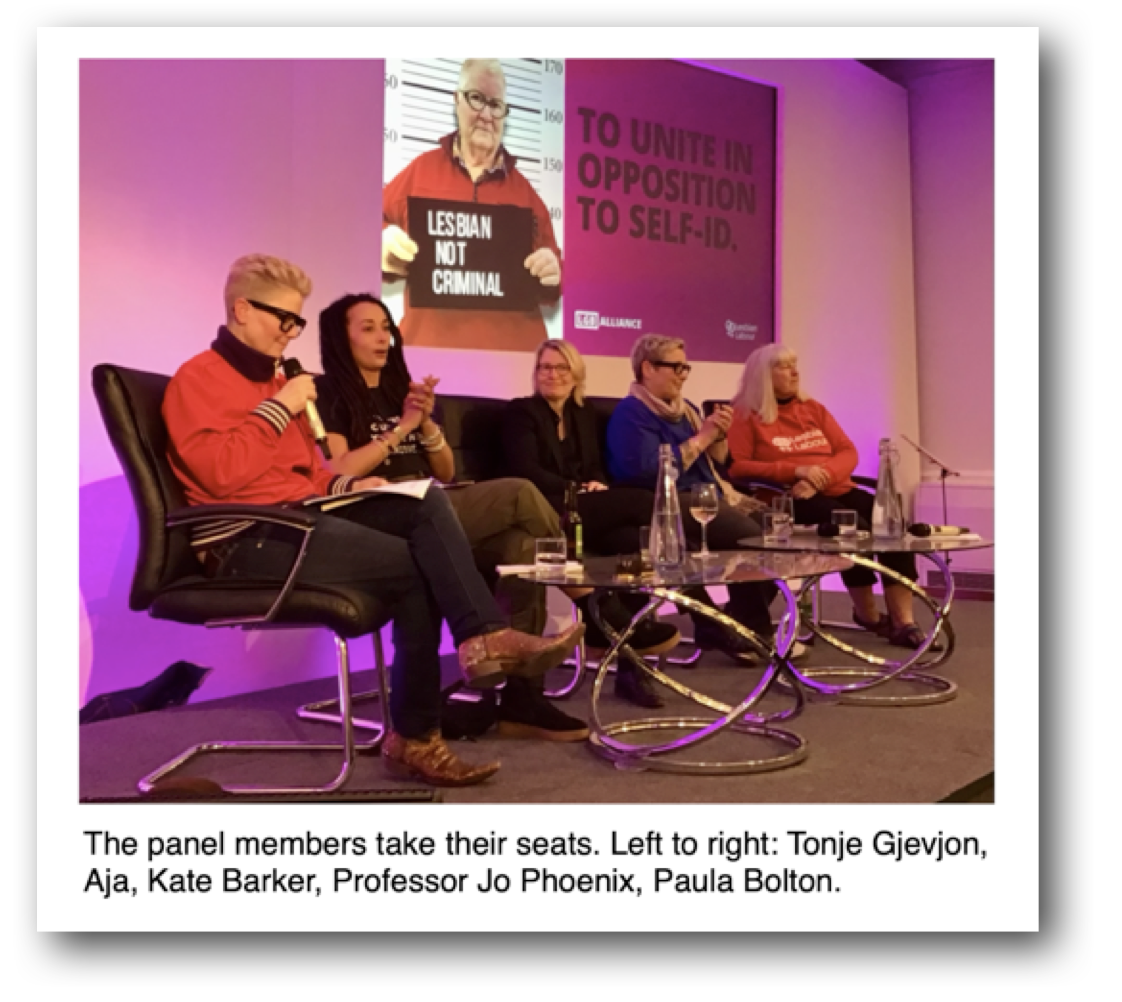
Tonje Gjevjon
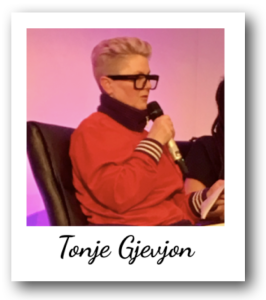 “My name is Tonje. I am a woman, an artist and a lesbian,” began Tonje. “I have been under investigation for breach of the Norwegian hate speech law.
“My name is Tonje. I am a woman, an artist and a lesbian,” began Tonje. “I have been under investigation for breach of the Norwegian hate speech law.
Yesterday morning I received a letter from the police saying, and now I quote, “you are hereby notified that the case against you has been dismissed because no criminal offence is considered proven. This means that the investigation strongly suggests that nothing punishable has happened.”
This announcement was met with much applause and whoops from the watching women.
Tonje, who has been involved in performances concerned with the female body, women and girls’ issues and the LGBT movement since 1999, urged us ‘use your rights or lose your rights’ and said that the result of her case showed that we must exercise our right to freedom of speech while we have it and to ‘fight for our rights as women and as lesbians’.
In Norway, she told us, hate speech laws are being abused by transactivists and used to harass women. I was horrified to lean that Norway has the most extreme self-ID law in the world; it permits children as young as seven to change their legal sex without any medical explanation and with the consent of just one parent.
Tonje suggests that it was round 2016 that it became no longer possible to openly discuss issues surrounding gender. Discussion was quickly replaced with the slogan ‘no debate’. “It does not stop at no debate,” she adds,”but goes further and attempts to remove the livelihoods of LGB & women’s rights campaigners.”
In 2018 Tonje and her wife, who perform as Hungry Hearts, were forbidden to perform her song Vagina Anthem– by the very art institution that had invited them to participate in the exhibition in the first place.
If you haven’t heard ‘Vagina Anthem’ you can listen to it here.
The chorus goes like this:
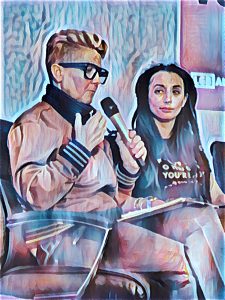
Tonje & Aja
“We are women, with vaginas,
we gave birth to all you fools
we are women, with vaginas,
we are here to change the rules
We are your mother, your sisters, your lovers
what the fuck is wrong with you?
we are your mothers, sisters, daughters,
So what the fuck is wrong with you?”
A few days before the opening, Tonje told us, she was contacted with the news that management felt that the lyrics of Vagina Anthem could hurt or offend men who did not have a vagina.
At this point the audience burst into laughter and Tonje paused for a moment before adding that they had also informed her that ‘under the circumstances’ they could not ‘assure her safety’.
In 2021 a gallery owner told her that no artist could be associated with her and that she was essentially blacklisted.
In March 2022 transactivists contacted Tonje’s wife’s employer, in an attempt to destroy her nursing career. They claimed that she was responsible for ‘spreading hatred’ because she had been photographed standing next to Tonje, while Tonje held a placard reading ‘transwomen are men’. Her ‘mere presence near the placard’ meant that it was claimed that she was unfit to do her job. Speaking of her own feeling at this time, Tonje told us, ‘something inside me broke’. She paused for a moment at this point and a heavy silence hung in the room before she continued.
About 2.5 million pounds is given by the government to ‘queer’ organisations in Norway, we were told, and these organisations fund and employ heterosexual men who ‘identify as women, lesbians and mothers’. These men also educate and give advice to young gays and lesbians. School children are taught gender identity as a universal truth. Academics, both male and female, in Norway- “biologists, doctors, parents, students, children, politicians and anyone who dares to discuss gender identity” and the legislation surrounding it- are targeted. The new hate crime laws, she says, removed protection from lesbians who no longer have protection from sexual harassment or hate speech.
“And lesbians who do not believe that men can be lesbians are labelled transphobes. And bigots… we must be able to call out the behaviour of those who discriminate against lesbians without having to be careful of the words we use.”
The new laws, she asserts, are in contradiction of international law protecting women’s rights. ‘The vast and destructive consequences of this new belief system’ are an “irrational encroachment of freedom of expression” and affect everyone “especially women, lesbians and artists… and academics.”
Tonje asked us to make sure we kept fighting ‘to ensure that what has happened in my country does not happen here’.
“We are looking to you, TERF island, to keep it together. Avoid splintering; we are adult human females and should act like adults not children. Let’s do it all of us, regardless of our difference.”
Aja
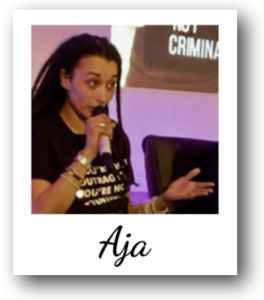
‘We are in crazy times where men can be lesbians,’ observed Aja. She wanted to talk about self ID because it is not just turning men into lesbians ‘it is turning lesbians into men- at an alarming rate’.
“Every time a young lesbian decides to opt out of the life, we lose a bit of ourselves, a bit of our culture and a bit of our history and I want to protect and preserve what we have now for the next generation just as you lot,” she gesticulated towards some of the older women in the audience, “protected it for me.”
Aja told us about the experience at Pride in 2018 that ‘peaked’ her. There she met two young women, friends-of-friends, who told her how Pride had been protested by some ‘bigoted TERFs’. They never mentioned the words lesbian or women but Aja remembered how she ‘could feel the hate coming off them’. This was the first time she had heard the word TERF. Curiosity led her to Google which led her to Angela C Wild’s podcast and another term she was unfamiliar with- The Cotton Ceiling.
“The old line of ‘just try it you might like it’ just turned into just ‘try lady dick or you’re a bigot’. That can fuck right off.”
A few months later she ran into the same two women.
“Neither identified as lesbians, or women, anymore. They claimed to be two men in a gay relationship. ‘A proud gay couple’. That was a bit of a mindfuck… I couldn’t hang around with them long because the scars on their chests were just screaming ‘help’ to me, but nobody else seemed to hear it.’
When she was younger, she said, there were LGB clubs outside school, and, later on, lesbian bars she could go to.
“but that’s all gone, they don’t exist any more. The only spaces that young lesbians have now are activist spaces.”
Aja spoke again of the importance of bridging the generational gap, saying she no longer really considered herself a ‘young’ woman, and stressed the importance of lesbian spaces away from activism and gender ideology. Finally, she suggested that older women in the audience found a younger woman to uplift or mentor.
“We need to find a way to elevate younger women because they are the future of this movement.”
Professor Jo Phoenix
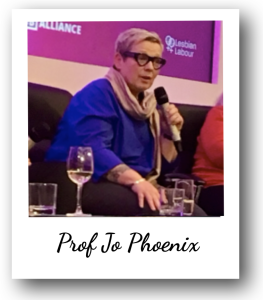
‘That was superb,” said Jo, of Aja’s speech, adding that she presumed she was ‘speaking to the converted’ and asking ‘what can I say that hasn’t been said before?”
Jo ‘came out’ back in 1979 when she was fifteen years old. She remembers books that acknowledged Biology, that talked about women as a sex class and about same-sex attraction, and while the detail is vague, ‘the thing that sits underneath it all is the absolute irrationality and implausibility of identifying into or out of a biological class’.
On the subject of identity she had this to say.
“‘The one thing we can say about identity… is that identity is never fixed. Identity moves contextually. It moves through time. At this moment I identify as an academic; in a few minutes I’m going to identify just as a person and a lesbian. I’m going to drop the academic. But (identity) moves all the time; it’s a bit like gossamer and it’s very changeable.”
Jo came out in 1979 in Texas and arrived in Shropshire, England in 1982. Her father worked in the research and development department of an oil company. In his work contract was a ‘morals clause’ which also included his family’s behaviour.
Herr father’s response to Jo’s out and wayward ways was to spare himself further embarrassment by offering her a one-way plane ticket to anywhere she wanted to go.
Jo took her British passport and and arrived on the doorstep of distant relatives in Shropshire.
‘So you’re a refugee,” offered one of the panel.
“I’m a lesbian refugee,” agreed Phoenix, as if the idea had not quite struck her before.
There were no lesbian bars in Shropshire, and no internet in 1982. Jo saw a Samaritans sign saying to call them for help, so she did, and- feeling it would be out of the question to say the word ‘lesbian’- asked where she could find a woman-only space. When she arrived on her motorbike at the address she had been given, she was unimpressed to find herself at the local WI meeting.
It wasn’t until 1985 that she’ found some other lesbians’, at Bristol University where she had gone to study Sociology. There she met some women who were involved with the protests at Greenham Common.
She spoke of “that moment the mid 1980s; everyone who came out then knew that actually we were coming out against the backdrop of a couple of 100 years- if not a couple of millennia- of being silenced and being invisible; of having to find a code to speak to each other; to recognise each other; to have some underground way of making contact with each other.”
Fast forward to now, she talks of young lesbian academics who are afraid to show they have Julie Bindel’s ‘Feminism for Women’ on their bookshelf, or to challenge their LGBTQI+ plus plus staff network. They are also afraid to publicly support Phoenix, although many are happy to offer support in private.
They have seen what happened to people like Jo, and Kathleen Stock, so she understands their fear. For older, more established academics she has no such sympathy.
“I don’t understand the fear of the senior staff. They have nothing to lose and, I as far as I’m concerned, any of the currently gay male or lesbian people with ‘professor’ in front of their names who aren’t part of the other side but are just sitting by quietly… I think there’s a special place in hell for them.”
Although we are living in scary times, she concluded, the age of ‘no debate’ is over. She felt the fact there were no protesters outside shows how far we have progressed.
Paula Boulton
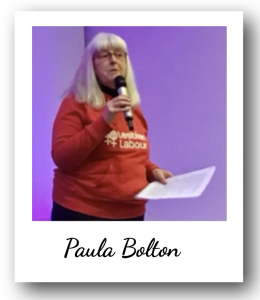 “I’d like to start with some audience participation,” began Paula.
“I’d like to start with some audience participation,” began Paula.
“Oh no you wouldn’t!” said somebody.
“Oh yes you would!” called out somebody else.
Paula asked us to relax and close our eyes and bring to mind our perfect partner, our hearts desire. “Imagine that image, enjoy it and keep it to yourself. Now I want you to imagine somebody who you couldn’t possibly be physically attracted to because of their sex.”
I found this exercise a little bemusing on several levels. Firstly I have no idea off the top of my head what my heart’s desire might look like. Most of the time it’s probably a box of Ritz crackers or an almost-frozen can of Cherry Pepsi rather thasn another human being. Secondly, I can’t think of a scenario where I couldn’t possibly be physically attracted to someone purely because of their sex, because I’m bisexual.
Paula’s experiment was aimed primarily at a lesbian auddience, of course, and I understood her point- that being told that you need to work on ‘broadening your sexual preference’ is tantamount to conversion therapy.
P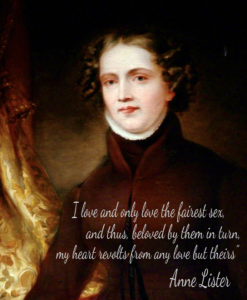 aula quoted Anne Lister, “I love and only love the fairest sex, and thus, beloved by them in turn, my heart revolts from any love but theirs”
aula quoted Anne Lister, “I love and only love the fairest sex, and thus, beloved by them in turn, my heart revolts from any love but theirs”
She spoke of operating under the radar; secret meetings; underground networks ‘away from the withering glare of the misogynistic patriarchal spotlight’.
She expressed her concern for gender non-conforming girls, ‘struggling through puberty trying to resist the sexism all around, desperate to escape the hyper-feminization everywhere. Maybe you think you’re nonbinary? …so you go to a well-funded LGBTWTF youth group. You say you fancy girls and they ask you, “Are you sure you’re not actually a boy?”
She pauses.
“A lesbian is an exclusively same-sex attracted adult human female- and we don’t do dick.”
Much applause.
“We are lesbians, not LGBTQ women, we need to be visible and audible so that those emerging lesbians know that they are okay just exactly as they are; so they can see what their future lesbian life might look like.”
She told of a 14 year old girl who had initially come out as a lesbian then decided she was trans. “Well, I don’t know how to be a lesbian,” the girl had told a friend. “What do lesbians even wear? I know what trans people look like.”
One of the ways to organise and to resist, Paula asserted, is to join a political party. Paula is a founder member of the Labour Women’s Declaration (2019) and a co-founder of Lesbian Labour (2020).
Paula spoke about how women had become disillusioned with the Labour party, which still receives training from Gendered Intelligence. She asked how many women had voluntarily left the Labour party because of its thrall to tranactivism and a wave of hands rose up.
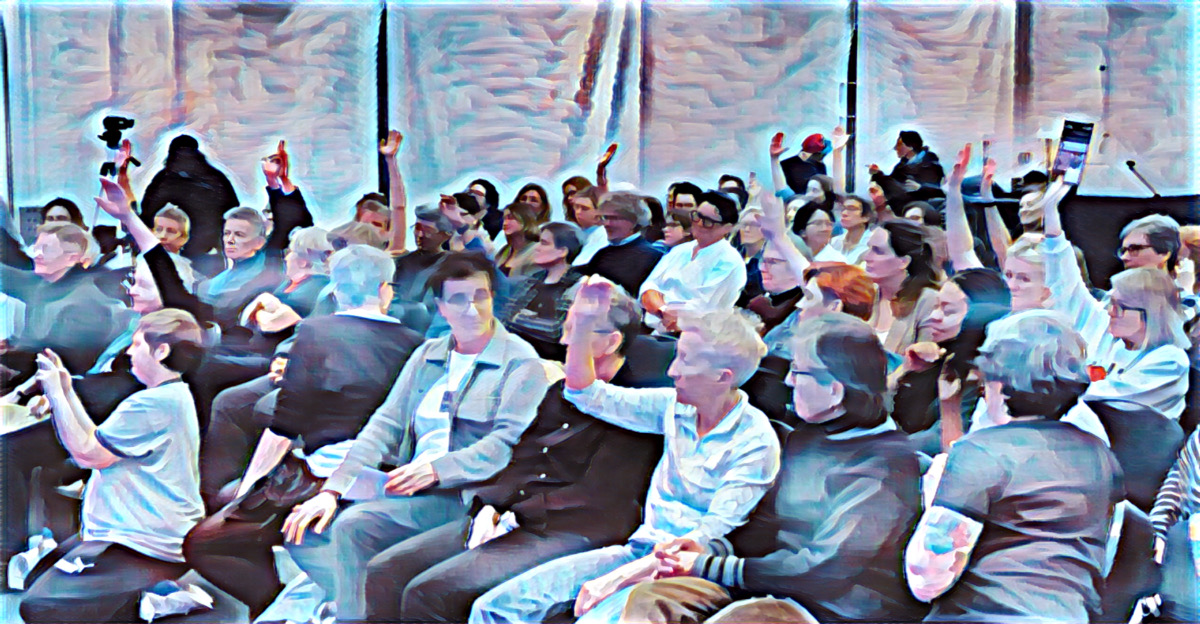
many women had voluntarily left the Labour Party
“Labour is losing women & Labour is losing lesbians… it’s our party. Socialism doesn’t belong to them.”
LGBT+ Labour (affiliated) will not work with Lesbian Labour, she told us, saying most lesbians do not share the latter’s values. Angela Eagle will not respond to their requests to meet. Eagle’s partner Maria Exdall, now president of TUC, accuses Lesbian Labour of being a gateway to the far right. Many trade unions are now adopting self-ID.
Boulton read out a message from Rosa, one of the Women’s Declaration International contacts in Malta, where self-ID is law.
“We can no longer have lesbian only spaces. Young lesbians that are not feminine are being brainwashed and told that they are men, with the unnecessary surgery and hormones that comes with it. Those that regret it are too scared to speak. Young lesbians no longer know what a lesbian is because they are taught to include men. This is lesbian erasure, it is conversion therapy: conform to stereotypes or you will be made to. Please, do not do the same in the UK. Good luck.”
Paula concluded:
“We also know how to weave a web. We are the spinsters, experts at word of mouth, gaydar, secret signals and it’s how we’ve survived. Organise in small clusters; affinity groups- impossible to find a leader and therefore impossible to shut us down. And now we have social media, a tool allowing us to spread internationally.. .remember this: forty years ago, before mobile phones, we got 30,000 women to Greenham Common. We know how to do it and we’ve never had funding, so being hidden and unfunded may be barriers but that’s not going to stop us. Our lesbian revival is on the way!”
Question Time
Kate Harris thanked the women on the panel and encouraged us to use the bar, and for lesbians to have their photo taken with the ‘lesbian not criminal’ sign before and after question time.
Questions were asked about working with other political parties.
Paula replied that there are gender critical women in all parties and Women Uniting, a cross-party group fighting for women’s sex-based rights, has been having regular meetings. She mentioned Liberal Voice for Women, who now have an LGB forum, and said that Conservatives for Women were ‘absolutely amazing’ and got ‘right in there lobbying’. The only party that had a positive policy on this issue, however, was the Communist Party.
Someone suggested that the Social Democrats also had a good policy.
“What we find hard,” said Paula, “is to find any Tory lesbians.” A brief and enthusiastic discussion followed on the subject of Tory lesbians.
Kate Harris observed that self-ID in Scotland was halted by women ‘working behind the lines… with every single party… we did it by working cross- party, cross-generation, cross every-group-you-could-imagine, because it was provable nonsense.”
Questions were asked about self-ID in Norway, and how we could avoid Britain going down the same path.
Tonje said she felt they pushed self-ID through in Norway in the same way they were trying to do it in many other places. By avoiding a lot of publicity, lobbying youth groups and political parties, claiming it was a good way to make life easier for a very small number of people and that it wouldn’t affect anyone else. “Then once it’s in place we start to realise that actually it affects everybody”.
Somebody asked if she thought it was anything to do with the ‘cult of the young’; older people wanting to appear liberal and progressive.
“People are naive,” replied Tonje, adding that there is a lot of emotional blackmail involved, specifically mentioning the threat of suicide and the pressure to ‘just be kind’.
The importance of duty, of speaking up and out in day to day life, even when it was difficult, was agreed upon. Jo Phoenix spoke about the importance of standing up for your values even when there may be a cost and implications for one’s career.
“I had probably four years of some really nasty harassment,” she told us. After the Maya Forstater ruling was announced she formed the Open University Gender Critical Research Network with some like-minded colleagues.
This brought the first session to a close.
“It’s been such interesting session,” concluded Kate Harris. “Thank you so much, everybody, for their contributions. I think one of the things that underpins everything everybody’s been saying is a real sense that we are winning. We’re making a difference. There have been so many significant things that have happened over the last year or so, it feels to us like the pace of change is only going to speed up. Something we can do is keep talking; keep meeting like this- more evenings like this, I think! So thank you very much- time to hit the bar!”
Question time concluded, it was time to be sociable. Time for refreshments, poetry & music. The wine was flowing freely (in quantity, not price) and the room was in high spirits. I chose a mango curry wrap from the selection of sandwiches for sale. It was surprisingly palatable.
Aja
I chatted with a few other women before taking my seat again for Aja’s recital of her powerful poem ‘Rage’. Below is a short extract. Vsit her YouTube channel, ‘Aja the Empress’ where you can hear her perform the whole thing, and other inspired pieces, here.
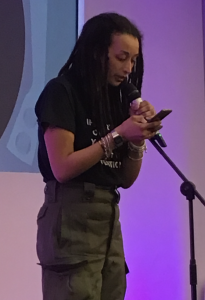 “…I am Rage
“…I am Rage
I am the mother, the daughter, the sister, the aunt
the grandmother and wife
I am the Alpha and Omega of life
you call me weak yet I am the power of creation
I am the bedrock of family and civilization
I have raised the world in my womb
you have life because I gave it to you…”
Tonje
After Aja’s performance, Tonje performed her Eurovision hit ‘Laika’.
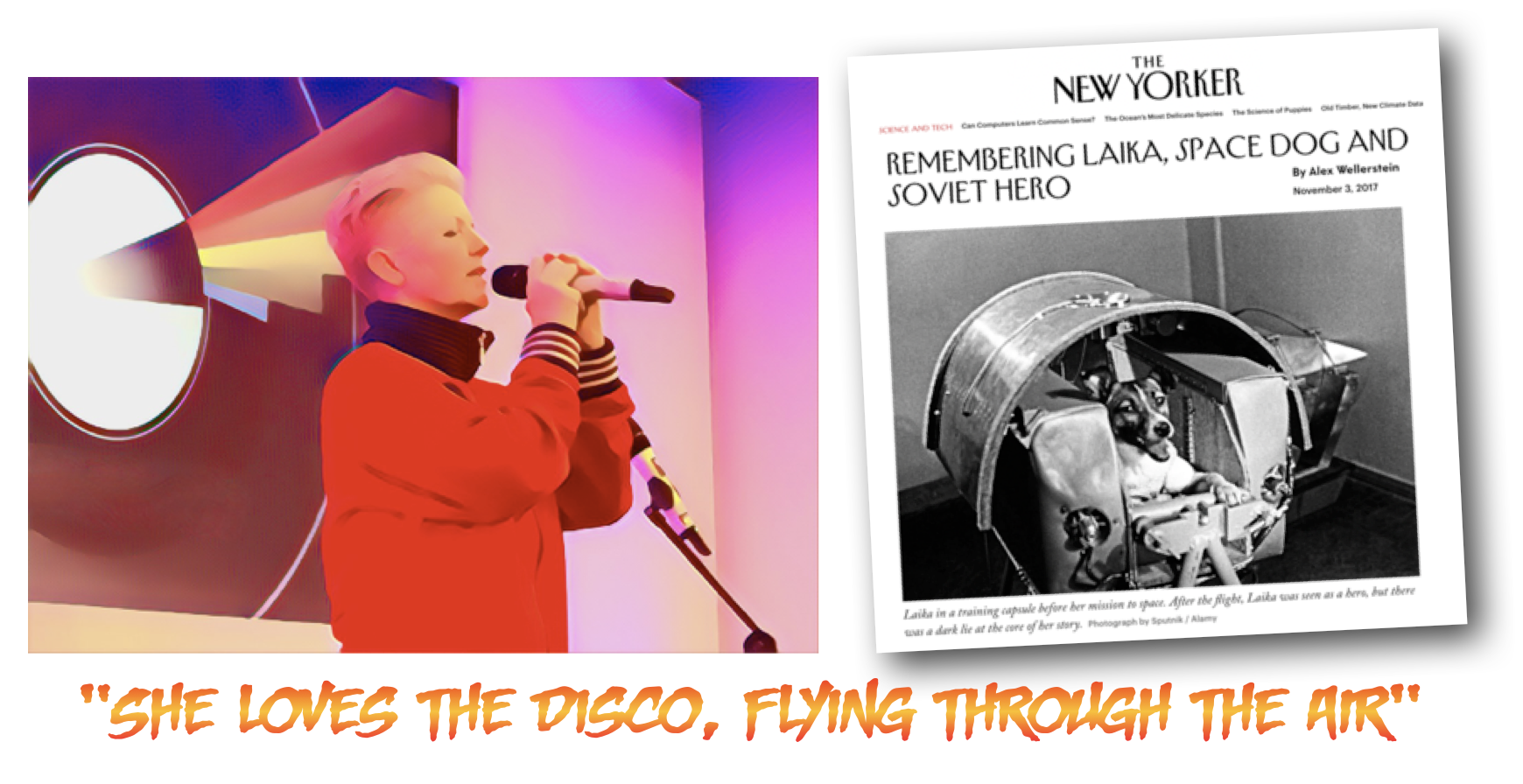 In 1957, a street dog named Laika became the first Earthling to orbit our planet when she was sent into space by the soviets. Laika, who was sent to certain death in Sputnik2, touched the imagination of Tonje as a girl, resulting in a song for Norway’s 2016 Eurovision Song Contest entry, about a lesbian dog who misses Moscow, her girlfriend & the disco. Weird? Yes. Brilliant? Also yes. Listen to the official music video here. Read more about Laika here.
In 1957, a street dog named Laika became the first Earthling to orbit our planet when she was sent into space by the soviets. Laika, who was sent to certain death in Sputnik2, touched the imagination of Tonje as a girl, resulting in a song for Norway’s 2016 Eurovision Song Contest entry, about a lesbian dog who misses Moscow, her girlfriend & the disco. Weird? Yes. Brilliant? Also yes. Listen to the official music video here. Read more about Laika here.
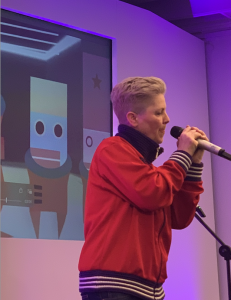 “A lonely drum beat out in space,
“A lonely drum beat out in space,
repeats the heartbeat forever lost
floating like a dream in an empty room,
a weightless Laika looking at the moon
a homeless shadow trapped in a cosmic computer,
a little curly dog embraced by endless space,
An echo of her life floating like a dream,
Forever lost in the sputnik space machine …”
After ‘Laika’ Tonje and Paula performed Tonje’s new song ‘All the Things We do for Love’ and then it was time for the epic ‘Vagina Anthem’. Everybody was up and dancing for this one. You can hear the 2019 version here. The Hungry Hearts are also on Spotify.
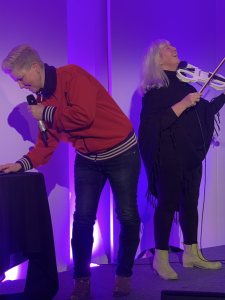 “I’m a lazy stupid bimbo
“I’m a lazy stupid bimbo
A moody curvy chick
A tomboy or a dyke
And your shaming makes me sick
I’m a hateful ugly TERF
A nasty bossy cunt
I’m a slut, I’m a virgin
I insulted Donald Trump
I’m an angry pussy rebel
I’m the one you want to silence
What the fuck is wrong with you?
What the fuck is wrong with you?”
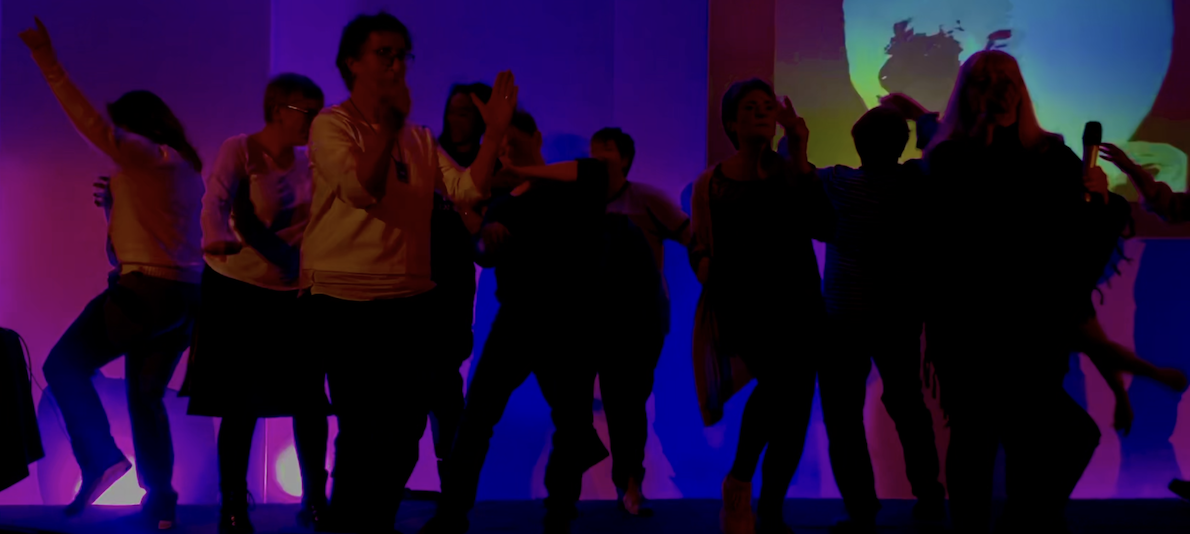
women- with vaginas- dancing
Jess
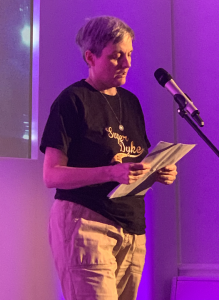
Jess
Jess read an evocative poem about women laughing and wolves howling around a fire, all so powerfully that the men were afraid. It began:
“Once we danced around a wild fire at full moon
when the wolves really did howl
when we whooped and cheered and hollered
did rituals
and danced and sang and held hands
and fed the fire
enchanted by the flames…”
I missed some of the poems as I had to leave the auditorium to go to the loo and got caught up with an old friend. I hope to hear Jess read again sometime. Kathryn, who had also been expected to read some of her poetry, was unable to attend.
There was more singing, and many of the women danced a congo around the auditorium singing a song about how lesbians united would never be defeated. It was very catchy and very long and part of it went something like this “Lesbian, lesbian, lesbian! United we must stand or divided we will fall, lesbian, lesbian, lesbian! Lesbians united, will never be defeated! Lesbians united, will never be defeated!”
Everybody looked like they were having a whale of a time and I would have jumped up and joined them, but, well, I’m not a lesbian so I didn’t. It was a great song, though.
(This led to a discussion in a group I’m in about if there were any songs about being bisexual. We couldn’t think of any actual songs but did come up with some song titles “Bi Bi baby’, ‘all bi myself’ and ‘Oh Lord, won’t you bi me a Mercedes Benz’ among others. But I digress.)
The dancing went on for a while, I watched the happy faces and reflected on the fact that this was the most joyous gathering of women I’d been to in a long time. Everyone was beaming and dancing and chatting. The atmosphere was brilliant.
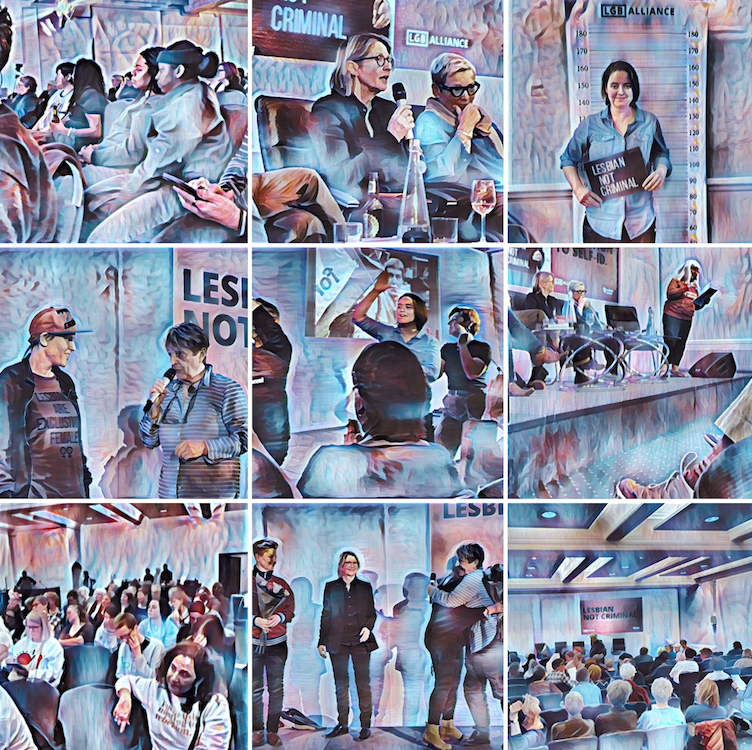
photo effects created with the Prisma app
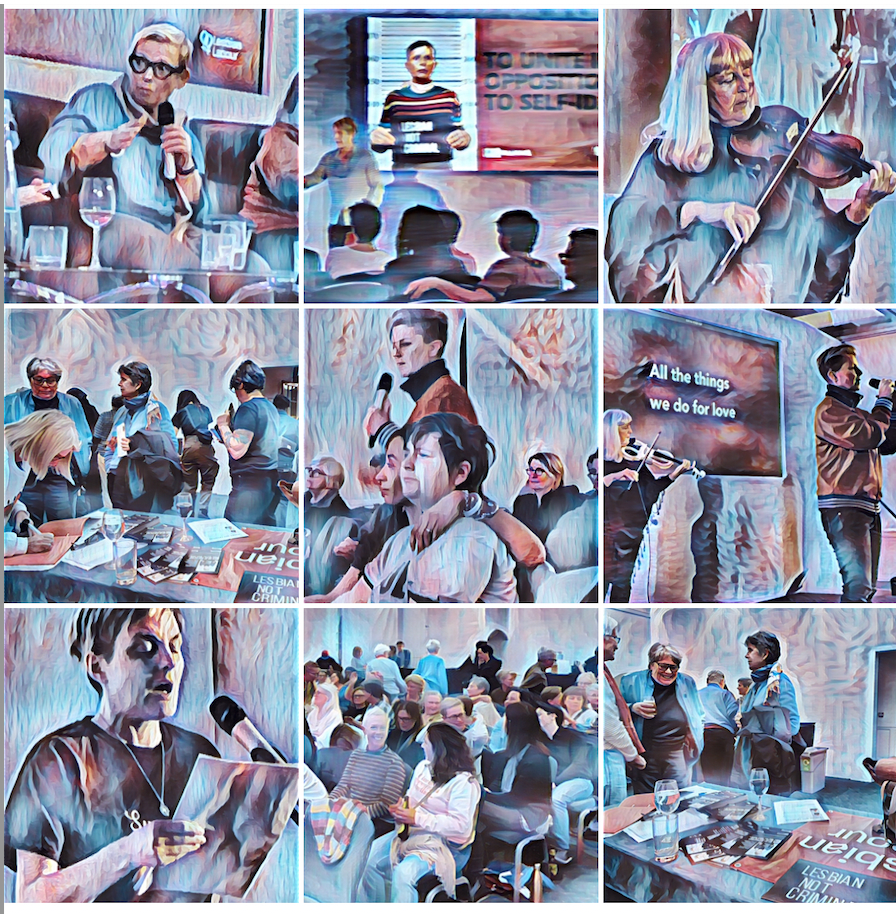
The final performance of the evening was from Trish. She rapped about gender politics, transitioning children, and lesbian erasure. I was sitting close to the speaker while she was performing; the music was louder than her voice so I couldn’t catch all her words.
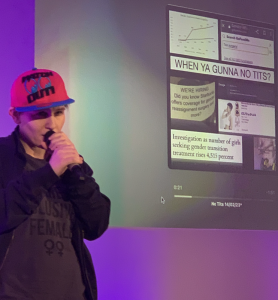 “I see through those lies
“I see through those lies
this is pseudo-science
they <something> our minds
they inflict violence
… they don’t want anybody to know the truth
because what they’re doing is called child abuse…”
It was after ten when Trish finished, the evening was drawing to a close. Just enough time for Kate to give out bouquets of flowers to the speakers, thank attendees for coming and for everyone to vow to gather again soon.
Some of the women went on to a nearby pub, I wrapped my scarf around my shoulders and headed for the station.
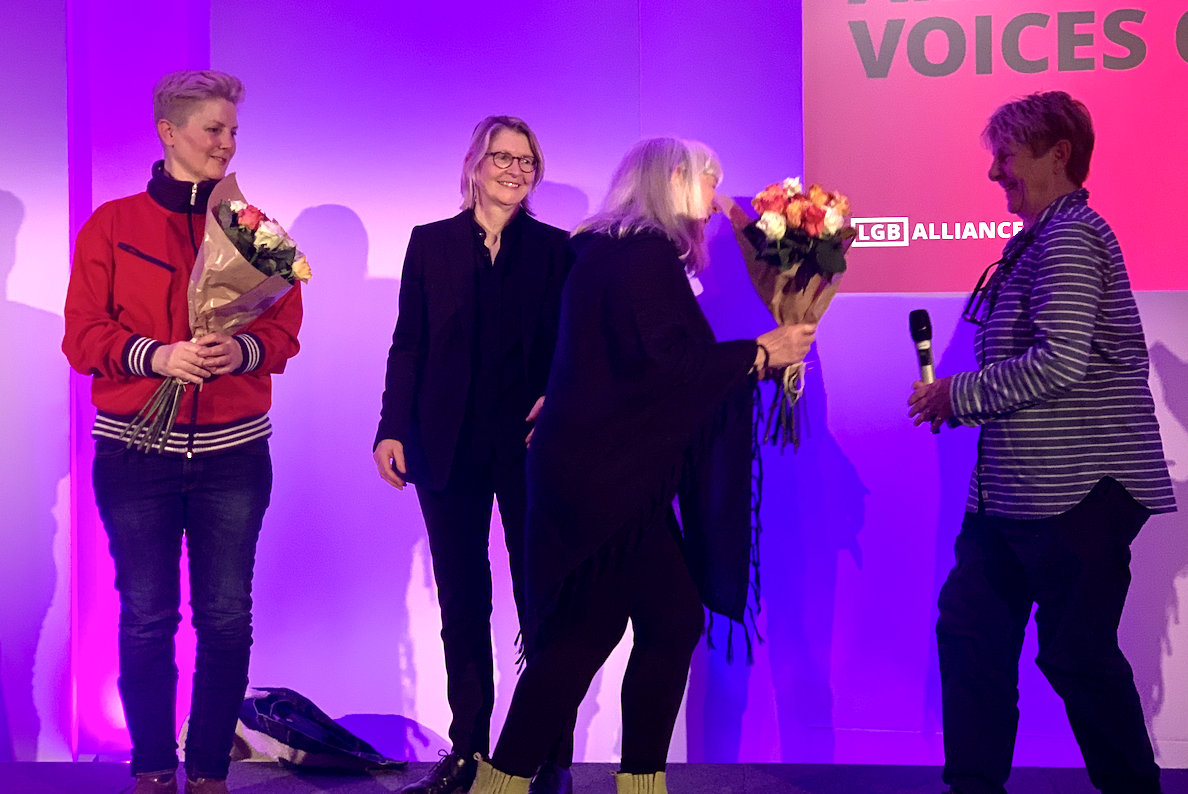
flowers for the speakers
The incredible energy and dedication shown in the auditorium that night could move mountains.
It may be many years before the gender woowoo blows away and the fog lifts and the world realises what a misguided, misogynistic and homophobic movement transactivism was.
But on the evening of Thursday 16th February 2023, I was hanging out with the lesbians and their friends and all was right with the world.

Please CORRECT the spelling of PAULA BOULTON’S name. This is no
t acceptable!
I have corrected the spelling, thank you for pointing it out so graciously.